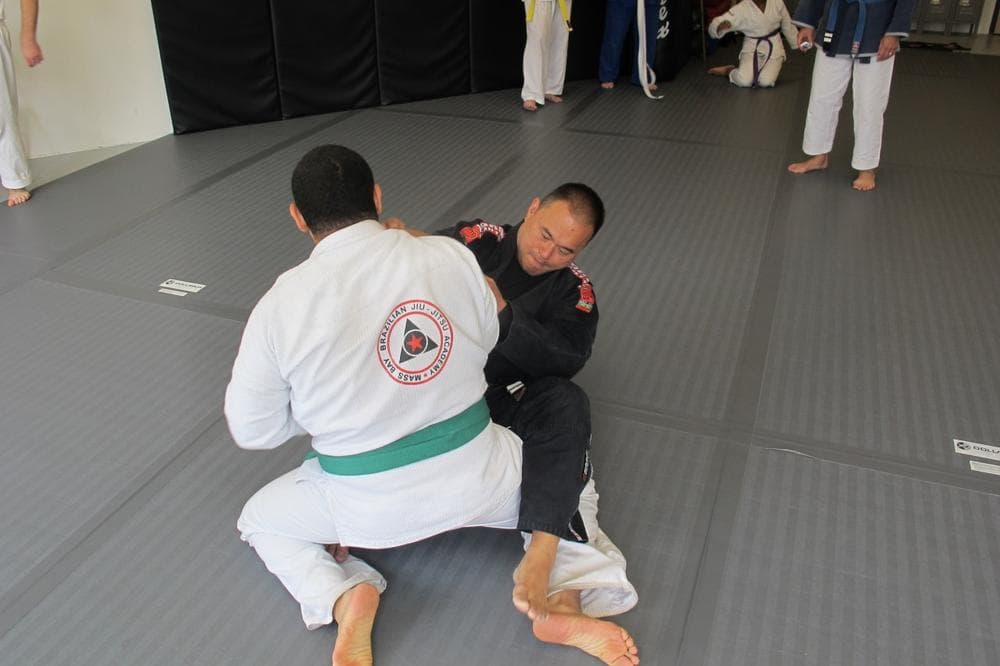Advertisement
In Depth
Can Karate Hold Its Own In The Mixed Martial Arts Era?
Resume
This month the Ultimate Fighting Championship will host events in Boston, Indianapolis, and Milwaukee. The professional mixed martial arts league will also be a key part of Fox Sports 1’s programming, when the TV network debuts this weekend. As the profile of mixed martial arts - or MMA – keeps rising, an iconic martial art recently suffered a public defeat. The International Olympic Committee voted to exclude karate from the 2020 Summer Games.
In fact, despite a decades-long campaign, karate has never even qualified as an Olympic exhibition.
“I started in karate in 1990 and I can remember at the time hearing that karate was going to be in the 1992 games in Barcelona and then it was going to be in the 1996 Games in Atlanta,” said Jake Lease, interim CEO for USA Karate.
The sport’s latest Olympic push comes at a challenging time for martial arts in general. According to the Sports & Fitness Industry Association, there were nearly 6.9 million martial arts practitioners in the U.S. in 2007. By last year, that number had dropped by 26 percent. Martial arts could use some buzz. And MMA generates a lot of it. Lease likes anything that creates interest in traditional martial arts … with a few caveats.
We have had concerns about MMA's tendency away from some of the core martial values.
Jake Lease, USA Karate
Nearly 2 million U.S. residents used MMA training for fitness last year. That’s up nearly 12 percent since 2010. Sports Illustrated Executive Editor Jon Wertheim writes about the UFC, which has seen dramatic growth in the last 10 to 15 years.
“But it has not necessarily been entirely organic growth,” he said. “In some cases, it’s meant syphoning boxers and it’s also – this has gotten less attention – but it’s really changed the face, at least in the U.S., of traditional, classic martial arts.”
And Wertheim says that trickle-down effect is easy to spot.
“Traditional, Mr. Miyagi karate dojos are recognizing that to compete they really need to offer MMA, because that’s what the kids want,” he said.
Jordan Breen is the administrative editor for Sherdog.com, which covers competitive mixed martial arts. Breen says most MMA fighters build their training on three primary arts: wrestling; the ground fighting of Brazilian jiu jitsu; and Muay Thai – a style of kickboxing developed in Thailand.
“No one is going to – for the most part – go out and rock a karate stance to try to win an MMA fight that way,” Breen said.
On a recent Saturday, karate students in Boston’s Jamaica Plain neighborhood slammed kicks into large heavy bags. Their instructor was David Shim, a ninth-degree black belt. A clinical psychologist by trade, the 52-year-old took up karate at age 11 as another closely related martial art was making headlines.
“Everybody was into kung fu because Bruce Lee had just died and his movies were really popular,” Shim said. “There was the old TV show ‘Kung Fu’ with David Carradine. Everybody was kung fu fighting back then.”

In January, Shim and a partner opened their new gym. Karate is a big part of the business, but the studio’s name is a sign of the times: Mass Bay Brazilian Jiu Jitsu. Since 2006, Shim has been hooked on the ground fighting and grappling of jiu jitsu. He says after decades of karate practice that relied on light, controlled contact, jiu-jitsu’s intense sparring - or rolling – seemed shocking.
“Man, when I saw jiu jitsu, I was like what are they doing?” Shim recalled. “The first two to three minutes of jiu jitsu is very uncomfortable because you’re like up close to somebody. Then you either love it or you don’t. For me, martial arts that’s going to be effective has to practice some level of reality.”
The reality is that a lot of fights end up on the ground and karate is primarily a stand-up art form. Shim said karate students focused on self-defense can learn from jiu jitsu experts.
“They’ve introduced a new technology,” Shim said. “It’s like when people used to use those 3.5 disks. And then all of a sudden you’ve got these zip drives and stuff and then you’ve got virtual storage. Think about it. Is there anything wrong with still using 3.5 disks? Well, no. But you’re at a serious disadvantage compared to what everybody else is doing.”
Dominick Cruz is the current UFC bantamweight champion. Cruz comes from a wrestling background, but asked if karate was too old school for MMA, he referenced another prominent UFC fighter.
“No, it’s not out of fashion,” he said. “So, if you’re Lyoto Machida, he has figured out a way to make karate extremely relevant and extremely useful in all his fights, and it’s because he mixes his karate base with Muay Thai, boxing, wrestling, and everything else. And now it’s an evolved version of karate that he’s formed, and it’s MMA.”
But Sherdog.com’s Jordan Breen said says Machida’s recognizable karate style is the exception.
[sidebar title="Olympic Hopeful" align="right"]Karate won't be included in the 2020 Olympics, but there's still hope for wrestling.[/sidebar]“It’s not something that’s always necessarily visible,” Breen said. “I think people look for karate in MMA or want a validation of a style. And they want someone who looks like Lyoto Machida or seems like an actual, real-life incarnation of the Karate Kid and the fact of the matter is the benefits of many traditional martial arts in mixed martial arts are much more subtle.”
As mixed martial arts continues to drive fads in studios across America, instructor David Shim isn’t worried about his first martial arts love: karate.
“I often think about when karate came into existence back in Okinawa a century and a half ago and people were like, ‘What is this?’” Shim said with a smile. “I’m actually excited about what the next thing is because they’re developing their own counters to jiu jitsu, so what’s next?”
Predicting the next big thing in martial arts is tricky business, but it’s safe to say that karate will be in the mix.
This segment aired on August 17, 2013.
